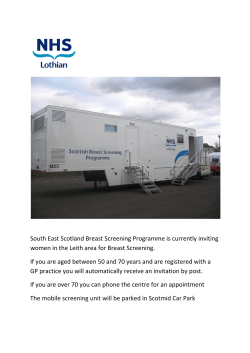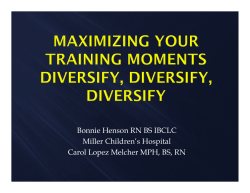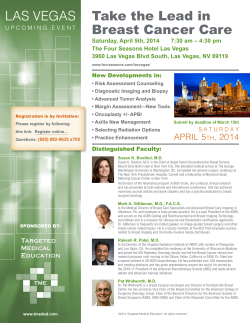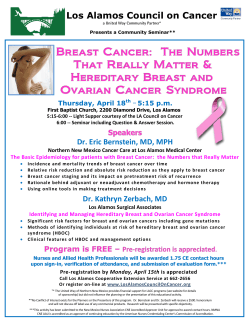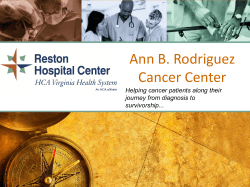
conference brief 2015 - Mammography Education, Inc.
BREAST CANCER IN THE ARAB WORLD To w a r d s A n E n a b l i n g E n v i r o n m e n t Meeting Current And Future Challenges Amman- Jordan 22-25 March 2015 Conference Brief L e M e r i d i e n A m m a n - J o r d a n 22 23 24 25 M a r c h www.breastcancermena.com Led by: In Partnership with: Organized by: JORDAN BREAST CANCER PROGRAM (JBCP) The Jordan Breast Cancer Program (JBCP) is a nation-wide program led and supported by the King Hussein Cancer Foundation (KHCF) and Center (KHCC) for the development and provision of comprehensive breast cancer screening and early detection services for all women in Jordan with the aim of: 1. Reducing morbidity and mortality; and 2. Shifting the current state of diagnosis of breast cancer from its late stages to its earlier stages where the disease is most curable, survival rates are highest, and treatment cost is the lowest. Our multidimensional approach is designed to achieve several objectives including: 1. Increasing awareness of breast cancer and the importance of breast cancer screening and early detection. 2. Improving the availability and accessibility of mammography services in Jordan. 3. Establishing national unified protocols and guidelines. 4. Developing Standard Operating Procedures (SOPs) and Quality Assurance (QA) programs. 5. Building the capacity of health care personnel including and not limited to radiologists and radio technologists. ABOUT THE CONFERENCE This conference will be the first of its kind in the Arab world, providing a road map for countries in the MENA region to establish comprehensive national breast cancer early detection and prevention programs. The conference will convene leaders, decision makers, public health experts, health care providers, patient support groups, advocates and survivors for two days to address key challenges related to breast cancer. CONFERENCE OBJECTIVES • Convene diverse stakeholders, including policy makers, public health experts, health care providers, patient support groups, advocates and survivors to dialogue on the status of breast cancer early detection in the Middle East and North Africa (MENA) region. • Provide an overview of global context and regional implications as a benchmark. • Discuss challenges and opportunities at the regional and national levels in establishing comprehensive national breast cancer programming. 1 • Develop health system strategies to harness national platforms and create a blueprint for coordinated action. • Promote a south-south and multi-disciplinary knowledge exchange to generate innovative solutions. • Identify key recommendations for policy-oriented research and evidence-based policy-making for addressing the regional burden of breast cancer and to guide chronic care more broadly. • Build capacity and share experiences through training workshops on three focal technical areas: breast imaging, mammographic positioning and quality control and social behavior change communications. CONFERENCE THEMES Theme 1: Strategic Planning To Determine National Priorities And Align Action Theme 2: Health Systems Strengthening For Breast Cancer Early Detection: Applying The Diagonal Approach Theme 3: Harnessing Platforms And Partnerships For Multisectoral And Intersectoral Synergy Theme 4: Policy To Practice: Challenges And Solutions To Closing The Breast Cancer Divide 18 CME HOU RS Conference Registration fee $ 300 Date : 22 Opening Ceremony 23 24 Conference Sessions 2 CONFERENCE SESSIONS Day One: 23 March 2015 Opening and keynote address: Applying the Diagonal Approach to Health System Strengthening: The Case of Breast Cancer Welcoming Note And Introduction Burden Of Disease A Framework For Transforming Health Systems For Cancer And Chronic Care Meeting The Challenge Of Breast Cancer Early Detection: A Diagonal Approach THEME 1 – Strategic Planning To Determine National Priorities and Align Action Session 1.1: Developing a National Strategy for Breast Cancer Global Lessons Tailoring Strategies to Available Resources National strategies lesson learned Wrap up and Conclusion of the session Session 1 . 2: Evidence-Based Planning: The Breast Cancer Comparative KAP Study at the MENA Region THEME 2 – Health Systems Strengthening For Breast Cancer Early Detection: Applying the Diagonal Approach Session 2 1: National Stewardship For Policy Reform International Experience: Qatar, Egypt, Jordan Session 2.2: Innovative Financing National (Allocation of Resources) Session 2.3: Innovative Delivery Scaling up role of Primary health care Providers in Enhancing Early Detection of Breast Cancer Bring Service to the Doorstep Connectivity- KHCC Experience Special Debate Session Down-staging versus screening in the Arab World 3 Day two: 24 March 2015 THEME 3 – Policy to Practice: Challenges and Solutions to Closing the Cancer Divide Session 3.1: Current Best Practices and Barriers: Regional Experiences Exchange Session 3.2: The Dream Team: Multi-disciplinary Approach to Improve Early Detection (MDT) Session 3.3: Quality as A Culture - Solutions to Closing the Cancer Divide Highlighting HCAC national role Challenges Lesson learned Strengths THEME 4 – Harnessing Platforms and Partnerships for Multi-sectorial and Inter-sectorial Synergy Session 4.2: Mobilizing Civil Society: Bottom-up Approach for Health Communications and Changing Behaviors. Session 4.2: Fostering Public Private Partnerships and Role of Government. Session 4.3: Leveraging Partnerships with International Organizations Special Interactive Session Engaging People: Creating Change Driving Policy Change Through; Media, Opinion Leaders, Survivors and Advocates 4 CONFERENCE PARALLEL WORKSHOPS AND TRAINING SESSIONS The conference will offer health care professionals and social marketing experts the opportunity to receive high caliber training through parallel workshops addressing recent advancements in breast cancer early detection and diagnosis services and social behavior change communication models; both of which are crucial components for the success of various early detection efforts. Adopting the hands-on approach in its capacity building interventions, JBCP offers these parallel practical training sessions under the supervision of world renowned experts in breast imaging, community engagement and outreach. The parallel workshops include: HANDS ON SCREENING COURSE Combined with Multimodality Diagnosis of Breast Diseases with Emphasis on Breast MRI Led by: Dr. Laszlo Tabar, MD, FACR MAMMOGRAPHIC RADIOGRAPHERS’ INTELLIGENCE SKILLS Positioning and Quality Control SOCIAL BEHAVIOR CHANGE COMMUNICATION WORKSHOP Bottom Up Approach to Promoting and Sustaining the Early Detection of Breast Cancer ( In cooperation with AUB ) 5 Hands on Screening Course Combined with Multimodality Diagnosis of Breast Diseases with Emphasis on Breast MRI (Dr. Laszlo Tabar, MD, FACR) This three day workshop, led by Dr. Laszlo Tabar, MD, FACR and members of his faculty, will bring together practicing radiologists from the MENA region, providing them with an intensive hands-on experience of breast cancer screening, early detection and diagnosis. Participants will engage in breast cancer early detection dialogue while improving their diagnostic skills using the most up-to-date technologies. 18 CME HOU RS COURSE FACULTY László Tabár, MD., F.A.C.R. (Hon). Course Director Professor emeritus of Radiology, University of Uppsala School of Medicine, Department of Mammography, Falun, Sweden Mats Ingvarsson, MD Medical Director, Department of Mammography, Falun, Sweden COURSE OVERVIEW This course teaches how to find breast cancer in its early stages and how to arrive at the correct diagnosis of breast diseases using the multimodality approach. The course will offer participating radiologists: • Reading 150 full field digital mammography cases for screening at high resolution work stations (normal cases will be mixed with proven abnormal ones). • Feedback and discussion of every case by the Faculty after every reading session. • Special emphasis on diagnosis of early phase breast cancers. • Access to the complete imaging work up of all abnormal cases, including ultrasound, MRI, and large section histopathology. 6 • Progressive improvement of their interpretive expertise, as they learn the full spectrum of normal breast images, with all findings explained with the help of 3-dimensional histology images. (These skills will lead to fewer call-backs and greater confidence in reading large number of mammograms.) • Special sessions will describe the current clinical role of breast MRI, enabling participants to review the image patterns of malignant breast diseases, correlate the findings with the underlying pathology. • A Description of the recent technical advances in breast MRI, including imaging protocols and techniques needed to produce high quality images. • The techniques on how to characterize breast lesions utilizing multimodality imaging, breast MRI included. • Learning MRI reading and interpretation at high resolution workstations. ATTENDEES WILL RECEIVE • A unique present, a PDF copy of Dr.Tabár’s PowerPoint presentation of each positive case, including full explanation, mammographic workup/hand-held US, 3D automated US images and breast MRI with large section histologic confirmation. • Dr.Tabár’s book “Understanding the Breast in Health and Disease”. • Certificate confirming the actual number of mammographic examinations read under the direct supervision of an interpreting physician. COURSE OBJECTIVES • Learn the full spectrum of normal mammograms through detailed explanation of the mammographic images. • Progressive improvement of the attendees' interpretive expertise. • Increase confidence in reading large numbers of full field digital mammograms at lower call-back rates. • Improve skills in detecting early phase breast cancer at digital mammography screening. • Improve proficiency in working up screen-detected findings. • Appreciate the clinical relevance of unifocal/multifocal/diffusely infiltrating breast cancers. • Emphasize the importance of multimodality approach to workup cases in a multidisciplinary environment • Assess the clinical role of breast MRI in patient selection and inimproving the detection, diagnosis and treatment of breast diseases. • Characterize breast lesions utilizing multimodality imaging, breast MRI included. The goal is to accurately and efficiently identify, interpret and report on breast MRI examinations TARGET AUDIENCE • Radiologists • Surgeons Date : 22 Opening Ceremony 23 24 25 March (workshops at hotel) • Pathologists Fee 300 7 MAMMOGRAPHIC RADIOGRAPHERS’ INTELLIGENCE SKILLS Positioning and Quality Control This workshop aims to improve the practices of radiographers working in the field of breast imaging by engaging them in intense theoretical sessions including hands-on training on imaging techniques, positioning skills and breast imaging quality control testing. Radiographers will be trained on live cases at mammography units across the Kingdom, practicing positioning techniques using the most up-to-date guidelines. The workshop will be led by Louise Miller, Kimberly Flood, Fabiola Perez and skilled Jordanian radiographers. COURSE FACULTY Louise Miller, (ARRT, CRT, RTRM) Is Founder and Co-Director of the Mammography Practicum at the School of Medicine, University of California, San Diego. Kimberly Flood Is a specialized mammography technologist and is currently affiliated with Northwestern Medicine Lake Forest Hospital in Illinois, U.S.A. Fabiola Perez Is the Lead Breast Imaging Technologist at the Moores Cancer Center, She is also adjunct faculty for the UCSD School of Medicine’s Mammography Practicum. 22 Opening Ceremony Date : 23 24 Workshops Sessions 25 Field Training Session Fee Fee 200 200 8 SOCIAL BEHAVIOR CHANGE COMMUNICATION WORKSHOP Bottom Up Approach to Promoting and Sustaining the Early Detection of Breast Cancer The workshop is designed based on JBCP's successful experience in changing behaviors and impacting the national rates of early diagnosis through the adoption of a bottom-up approach which engages local communities and opinion leaders in social marketing activities of multiple formats, such as targeted and mass public awareness and outreach activities. The workshop will be carried out in close collaboration with the Outreach and Practice Unit and the Department of Health Promotion and Community Health of the Faculty of Health Sciences at the American University of Beirut (AUB). It will be based on active learning methods and participatory tools. Using experiential learning, the trainers will be using various interactive and participatory techniques such as role play, simulation, and individual and group exercises. The 3 days workshop is composed of 4 modules: • Introduction to Social Behavior Change Communication (SBCC). • Impact of SBCC on Health Outcomes (examples from the field). • Needs Assessment. • Designing and Planning a Behavior Change Communication Program. COURSE FACULTY Mayada Kanj, MPH Is a coordinator, Health Education Resource Unit (HERU), Department of Health Promotion and Community Health, Faculty of Health Sciences, American University of Beirut Martine Najem Kteily, MPH Is an instructor of Public Health Practice, Outreach and Practice Unit, Faculty of Health Sciences, American University of Beirut TARGET AUDIENCE • Breast health activists • Non-Governmental Organizations and Community representatives working in breast cancer awareness • Community leaders Date : 22 Opening Ceremony 23 24 25 March (workshops at hotel) Based Organizations Fee 200 9 HOW TO REGISTER Registration fees for the Breast Cancer in the Arab World Conference 2015 or any of its parallel workshops are as follow: Non Jordanians Registration Fees Jordanians Group Registration Individual Registration Onsite Registration Conference Sessions $150 $250 $300 $350 Hands on Screening Course $150 $250 $300 $350 $100 $170 $200 $230 $100 $170 $200 $230 Mammographic Radiographers’ Intelligent Skills Workshop Social Behavior Change Communication Workshop Jordanian participants will be covered by JBCP. For group registration (a minimum of five people) you are kindly requested to fill the online registration form for each participant and then contact the Jordan Breast Cancer Program via email at register@jbcp.jo for financial processing of your discounted rates. Online registration will be accepted till 10/3/2015. Afterwards only onsite registration will be available. Registration fees cover the following: • Access to conference sessions or workshop sessions (as selected by participant on registration form) • Access to conference/workshop lunches • Participation in the Opening Ceremony • Conference Dinner To register, please visit the website: www.breastcancermena.com For further information please contact the Jordan Breast Cancer Program at : Tel: 00962-6-55-30-800 Fax: 00962-6-55-30-870 10 www.breastcancermena.com Led by: In Partnership with: Organized by:
© Copyright 2025



